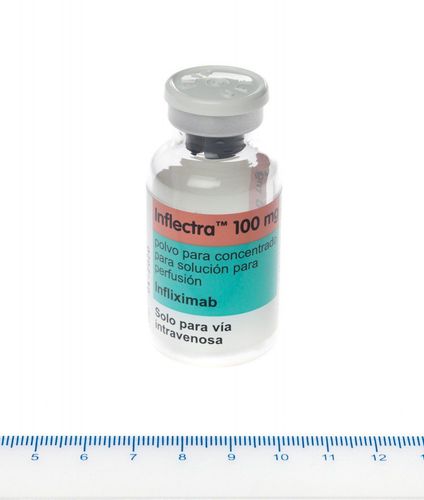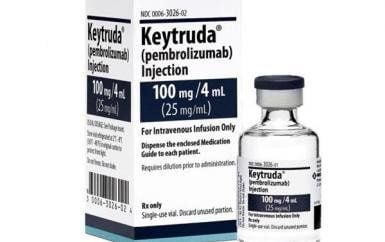This is an automatically translated article.
Cemiplimab - rwlc is a monoclonal antibody that stimulates the immune system to destroy cancer cells. Cimiplimab is a prescription medication and should only be used with a doctor's prescription. Patients should strictly follow the doctor's instructions when prescribed medication.
1. What is Cemiplimab - rwlc?
The body's immune system works by making antibodies. These are proteins that attach to antigens found on the surface of cells. The antibody stimulates the immune system to attack the cell it is attached to. As a result, the immune system kills the cells.
Monoclonal antibodies are made in the laboratory to attach to antigens found on specific cancer cells. These antibodies can act in a variety of ways, including stimulating the immune system to kill cells, stop cell growth, or other functions necessary for cell growth.
Cemiplimab - rwlc is a monoclonal antibody therapy drug. The drug stimulates the immune system to destroy cancer cells. Cemiplimab - rwlc works as an immunotherapy by binding to programmed death receptors found on T cells to stimulate the immune system to find and destroy cancer cells.
2. Dosage and instructions for using Cemiplimab - rwlc
Cemiplimab - rwlc is used by injection. The drug is injected directly into a vein by the nurse. The dose of the drug used for each patient is different, depending on the disease situation and the patient's physical condition.
Patients should inform their doctor of all medications, including prescription and over-the-counter medicines, supplements and vitamins you are taking. Steroids should be avoided while taking Cemiplimab - rwlc unless directed by your doctor.
Patients need to provide the doctor with all information about their health condition, including autoimmune diseases such as Crohn's disease, lupus, rheumatoid arthritis, ...All These diseases may be more severe with immunotherapy.
If you have or intend to have an allogeneic stem cell transplant, you need to inform your doctor because the drug can increase the side effect of the transplant called graft-versus-host disease.
3. Side effects of Cemiplimab - rwlc that patients may experience after using
Immune reaction after taking Cemiplimab - rwlc: This drug stimulates the body's immune system. Therefore, after taking the drug, the body's immune system attacks the normal organs and tissues in the patient's body. As a result, it causes complications that affect the health, life and life of the patient. Therefore, the patient should contact the doctor immediately if any of the following symptoms appear:
Diarrhea and intestinal problems: The patient may have abdominal pain, cramps, diarrhea, mucus stools. or bloody, dark or tar-like stools, fever. Skin reactions such as: rash, which may or may not be itchy, sores in the mouth, blistering or peeling of the skin. These manifestations can be severe and require treatment with corticosteroids. Lung problems: Pneumonia, new or worsening cough, trouble breathing or chest pain. Liver problems: Symptoms include yellowing of the skin, eyes, dark or brown urine, abdominal pain, bleeding or bruising more easily than usual, or possibly severe nausea and vomiting. Hormonal abnormalities: Immune responses can affect the pituitary, thyroid, pancreas, and adrenal glands, leading to inflammation of these glands. This can affect their production of certain hormones. Levels of these hormones can be determined by performing blood tests. When the body appears symptoms such as: headache, nausea, vomiting, constipation, fast heart rate, increased sweating, fatigue, weakness, voice change, increased urination, weight gain, loss of weight hair, dizziness, increased feeling of hunger or thirst, feeling cold all the time, and changes in mood or behavior, etc., the patient should immediately notify the treating doctor for appropriate treatment. . Kidney problems: Possible inflammation or kidney failure. Manifestations are decreased urine output, bloody urine, swollen ankles, loss of appetite. Brain or nerve problems: You may have headaches, drooping eyelids, double vision, trouble swallowing, weakness in your arms, legs, or face, and numbness or tingling in your hands or feet. Eye problems: When you notice any abnormal signs of the eyes such as vision changes, blurred or double vision, eye pain or redness, the patient should immediately notify the medical staff. Heart problems: Rarely, myocarditis has occurred. However, tell your doctor right away if you experience any symptoms such as chest pain, shortness of breath, trouble breathing when lying down or waking up gasping, feeling like a fast heartbeat, swelling in your legs, dizziness or lightheadedness. faint. Fatigue is a common side effect after using Cemiplimab - rwlc: Patients often feel tired. This is a common side effect of cancer treatment and is a feeling of exhaustion that often doesn't go away with rest. Patients need to plan their rest during the day and save energy for more important activities. Exercise helps the patient's body to fight fatigue and improve physical condition.
Less common side effects from taking Cemiplimab - rwlc:
Allergic reactions : In some cases, patients may have an allergic reaction to the drug after using it. Telltale signs include: shortness of breath or difficulty breathing, chills, fever, rash, itching, dizziness, fainting, back or neck pain, facial swelling. When there are any changes in the body during the infusion, the patient should notify the nurse or doctor immediately. Allogeneic stem cell transplant reactions: Patients treated with Cemiplimab - rwlc before or after allogeneic stem cell transplantation may have an increased risk of transplantation versus host disease, venous thrombosis, and syndromes fever.
4. The relationship between Cemiplimab - rwlc and fertility problems
Cemiplimab - rwlc can cause birth defects in the unborn baby. Therefore, women who are pregnant or intend to become pregnant or become a father should not use this medicine. If you are taking medication, strictly control fertility
Closely monitor fertility during treatment and for at least 4 months after stopping medication, even if menstruation stops or If you don't produce sperm, you can still get pregnant.
Patients should not breast-feed while taking Cemiplimab - rwlc and for 4 months after their last dose. Cemiplimab - rwlc is a monoclonal antibody that stimulates the immune system to produce antibodies to destroy cancer cells. The drug belongs to the group of prescription drugs, used only when prescribed by a doctor. The drug causes many serious side effects, patients need to be monitored during treatment to promptly detect and notify the doctor for appropriate treatment.
Follow Vinmec International General Hospital website to get more health, nutrition and beauty information to protect the health of yourself and your loved ones in your family.
Please dial HOTLINE for more information or register for an appointment HERE. Download MyVinmec app to make appointments faster and to manage your bookings easily.













